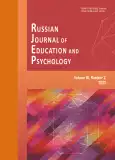Project as a final form of implementing research materials in a bachelor's thesis
- Authors: Osnovina T.Y.1, Tarasova N.A.1
-
Affiliations:
- Nizhny Tagil State Socio-Pedagogical Institute (branch) of the Ural State Pedagogical University
- Issue: Vol 16, No 2 (2025)
- Pages: 95-114
- Section: Educational and Pedagogical Studies
- Published: 30.04.2025
- URL: https://journal-vniispk.ru/2658-4034/article/view/302755
- DOI: https://doi.org/10.12731/2658-4034-2025-16-2-696
- EDN: https://elibrary.ru/EUNDOP
- ID: 302755
Cite item
Full Text
Abstract
Background. In light of contemporary educational approaches, the development of a project within the framework of a bachelor's thesis has become a necessary condition for demonstrating practice-oriented competencies of graduates. The project allows students to immerse themselves in the specifics of professional activity, express their creative and professional individuality, and offer a new methodological product to a basic organization in the social sphere – one that has undergone initial testing.
The purpose of the study is to analyze the effectiveness of implementing research materials in bachelor's theses, in which the practical component is presented in the form of a social project aimed at solving the problems of a specific client group.
Materials and methods. The research methodology is based on the use of project-based and competence-based approaches in preparing bachelor's students in Social Work for their professional careers. To assess the effectiveness of the project approach in the preparation of final theses, a longitudinal study was conducted.
Results. The article presents a seven-year experience (2018-2024) in applying the project-based approach in bachelor's theses in Social Work. The competencies that are more successfully developed through work on a social project as part of the thesis are identified. The authors outline pedagogical conditions for preparing and defending a thesis using the project approach, including guidelines for project development, the existence of a stable list of partner organizations, and recommendations for applying the research material.
Practical implications. The findings can be applied in teaching methodological project development in Social Work and in real-world cooperation with employers within the framework of bachelor's theses. The results also contribute to promoting project development and implementation as a means of solving practical tasks in the social sphere, as well as expanding cooperation with client organizations.
About the authors
Tatiana Yu. Osnovina
Nizhny Tagil State Socio-Pedagogical Institute (branch) of the Ural State Pedagogical University
Author for correspondence.
Email: podakatr@yandex.ru
ORCID iD: 0009-0000-5017-8753
Candidate of Pedagogical Sciences, Associate Professor, Associate Professor of the Department of Social Work, Management and Law
Russian Federation, 57, Krasnogvardeiskaya Str., Nizhny Tagil, Sverdlovsk Region, 622031, Russian FederationNina A. Tarasova
Nizhny Tagil State Socio-Pedagogical Institute (branch) of the Ural State Pedagogical University
Email: nintarasova@yandex.ru
ORCID iD: 0009-0009-8828-0943
Candidate of Historical Sciences, Associate Professor of the Department of Social Work, Management and Law
Russian Federation, 57, Krasnogvardeiskaya Str., Nizhny Tagil, Sverdlovsk Region, 622031, Russian FederationReferences
- Alieva, M. K. (2014). On the issue of the project method as a way to improve the level of professional training of future bachelors of the university. Young Scientist, (17(76)), 441–443.
- Vandyshcheva, L. V. (2022). Online projecting in the content of professional training of future specialists in social work. Bulletin of Samara University. History, Pedagogy, Philology, 28(1), 66–71. https://doi.org/10.18287/2542-0445-2022-28-1-66-71 EDN: https://elibrary.ru/CTFXYQ
- Voronov, Yu. S., & Denisova, T. T. (2017). Preparation of Graduation Qualifying Work in the Form of a Project: Methodical Recommendations. Smolensk: SGAFKST. 35 p.
- Emelyanova, N. A., Ilova, E. V., & Savelieva, U. A. (2023). Master's project graduation works as a result of forming universal and professional competencies. Pedagogical Research (Online Edition), (2), 5–26.
- Ershkov, A. A., & Tarasova, N. A. (2024). Forum theatre as a means of correcting aggressive behavior of minors. Scientific Notes of NTGSPI. Series: Pedagogy and Psychology, (2), 49–59.
- Lukina, A. O., & Tarasova, N. A. (2024). Social prevention in addressing issues of adolescents prone to dependency on vaping devices. In Problems of Psychological Counseling and Mediation in Modern Conditions of Russian Society (pp. 154–161). Nizhny Tagil – Ekaterinburg.
- Majura, A. V. (2017). Creative project as a form of final qualifying work of a future journalist. Social-Humanitarian Knowledge, (8), 309–316.
- Litvinova, T. N. (Ed.). (2020). Guidelines for Schoolchildren, Students, and Teachers on Conducting Scientific Research Projects "What is a Project and How to Write It?". Maikop. 68 p.
- NTGSPI (branch) RGPPU. (2022). Methodical Guidelines for Performing and Defending Final Qualification Works. Specialty 39.03.02 Social Work. Retrieved from https://www.ntspi.ru/sveden/files/Metodicheskie_rekomendacii_po_vypolneniyu_VKR_SR_2022.pdf (accessed: November 21, 2024).
- Osipov, V. M. (2023). Counseling in socio-psychological management of labor adaptation of employees of social institutions. In Problems of Psychological Counseling and Mediation in Modern Conditions of Russian Society (pp. 65–72). Nizhny Tagil – Ekaterinburg.
- NTGSPI (branch) RGPPU. (2020). Main Professional Educational Program of Higher Education. Specialty 39.03.02 Social Work. Retrieved from https://www.ntspi.ru/sveden/files/39.03.02_SR_UPvSS_2020.pdf (accessed: November 21, 2024).
- Plotnikova, I. Yu., & Klimova, O. V. (2022). Formatting of graduation qualification work by university students: standard requirements. Ekaterinburg: UrFU Publ. 92 p.
- Perevoschikova, E. N., & Kashtanova, S. N. (2015). Project as a form of final certification for an educational module. Higher Education Today, (4), 17–22.
- Ministry of Education and Science of Russia. (2018). Federal State Educational Standard 39.03.02 Social Work. Order dated February 5, 2018 No. 76 (revised February 8, 2021). Retrieved from https://fgos.ru/fgos/fgos-39-03-02-socialnaya-rabota-76 (accessed: December 22, 2024).
- Shmakova, A. A. (2023). Technology of social counseling in solving problems of sex education of minors. In Problems of Psychological Counseling and Mediation in Modern Conditions of Russian Society (pp. 110–120). Nizhny Tagil – Ekaterinburg.
Supplementary files










